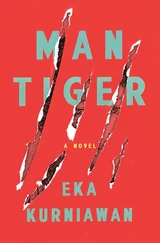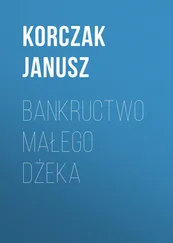“I’m going to make swim trunks,” he said to Adinda.
That idea seemed silly, even to Adinda. But he didn’t care. Comrade Kliwon bought a Singer sewing machine. He wanted to sell his shorts as cheaply as possible, because the tourists would probably only use them for swimming a few days before throwing them away. For that, he had to find the cheapest possible cloth. And for that, he went to ask his mother.
“Flour and rice sacks,” said Mina. “I usually use them to line pant pockets.”
Comrade Kliwon first studied bleaching techniques so that the merchant stamp could be erased from the sacks, and then he had plain fabric ready to be cut into the pattern of a pair of shorts. In truth, his shorts were not all that different from the shorts that farmers wore in the fields, but he distinguished them by silk-screening images onto the fabric before sewing the swim trunks. He designed these images himself, with the skill of a mediocre painter — brightly colored fish that he didn’t even know the name for, or coconut trees whose leaves curved randomly against the background of an orange-colored setting sun. And at the bottom every image, he wrote the word “Halimunda” in big letters. If they wanted to, the tourists could then bring them home as a souvenir to remind them of the city.
He distributed the shorts to the simple bamboo and tarp kiosks lining the beach and it turned out the tourists liked those shorts. Maybe because they were cheap, maybe because of the interesting designs, but definitely because they needed them to go swimming. The kiosks asked for more shorts, and Comrade Kliwon had to work harder. Adinda could sew a little, but she usually just helped out with the bookkeeping, because she had to take care of little Krisan. When it seemed that there were too many orders to fill, Comrade Kliwon would throw some of the work his mother’s way. Within a month, Mina was also overwhelmed and he bought three new sewing machines and hired three seamstresses and a silk-screen printer while still making all of the patterns and designs himself. Business was great, and he found that he didn’t mind that he had become a small-time capitalist.
Perhaps he was forgetting his past, but in any case Comrade Kliwon enjoyed his pleasant days, with his work that was going well, his beautiful wife, and his healthy baby boy. Competitors of course began to spring up, especially the Chinese and Padang workers from overseas, but Comrade Kliwon’s shorts were still the favorite shorts in Halimunda, and he was the latest business success.
But that happy life was soon destroyed by the mayor’s plan. Comrade Kliwon returned to being that Comrade Kliwon, the old Comrade Kliwon.
Halimunda was thriving as a beach resort and the greedy mayor began to hope that he could sell the land along the coast to developers to build big hotels and restaurants and bars and discos and casinos and maybe even brothels better than Mama Kalong’s. Most of that land belonged to the fishermen. Along the beach that abutted the street there was some more land that had no official deed holder, but that was filled with the humble souvenir kiosks. At first the local government approached the fishermen, asking politely if they would sell the land, and they gently tried to persuade the kiosk owners to move their kiosks to the new art market that would soon be built. But most of the fishermen refused to move off their ancestral land — their families had lived there for generations. They would never move inland, because they needed to smell the salty sea air. The kiosk owners didn’t want to move either, because the promised art market would be located too far from the bustling beach.
And so, the soldiers came, backed up by the preman , to intimidate the people. But don’t think that the fishermen scared easily — they faced death every night, out on the open ocean — and seeing the fishermen’s resolve, the kiosk owners held out too. After intimidation failed, there came force and coercion. The land between the ocean and the street was not unclaimed territory but in fact belonged to the state, said the mayor who came to the beach and gave a speech, and the bulldozers would soon come to knock down all the kiosks.
Comrade Kliwon couldn’t have such a thing happen before his eyes without turning back into the old Comrade Kliwon, though in fact no one knew whether he was acting out of solidarity or because his own business was being threatened. He organized a mass demonstration of fishermen and kiosk owners and many others sympathetic to their fate, the biggest demonstration since the collapse of the Communist Party. They blocked the roads against the bulldozers sent to flatten their flimsy kiosks until finally the army came. Comrade Kliwon still stood, leading at the front.
Intelligence agents sent to sniff out any communists amid the crowd of dissidents quickly recognized Comrade Kliwon. Reports were cross-checked, and it was soon confirmed that that man was truly an authentic communist. At the urging of the generals, Shodancho had to arrest Comrade Kliwon, and he laid into him, asking why he was doing such a foolish thing.
“I’m a communist, and any communist would do the same,” said Comrade Kliwon.
He was finally sent to Bloedenkamp and found that some of his old friends were still being held there indefinitely. They were surprised that Kliwon wasn’t dead, and even more surprised that he had come to Bloedenkamp after all this time. He was comforted to see so many people that he knew there, even though they were all living in heartbreaking conditions — starving, naked, and without any visitors. Their days were filled with interrogations and torture at the hands of the soldiers and guards. Given Comrade Kliwon’s reputation, he experienced the same thing, doled out in an even more harsh and sadistic manner.
“Trust me, he’ll survive,” said Shodancho, calming his furious wife. “And even if he does die, communists always come back to life as ghosts, as you and I know very well.”
“Tell that to Adinda and his child,” said Alamanda.
Not long after that, the entire group of communist political prisoners at Bloedenkamp was moved to Buru Island. All of them, without exception. Nobody knew what would happen to them there. Maybe it was a kind of Boven-Digoel from colonial times, or maybe it was like a Nazi concentration camp. All of the prisoners anticipated excruciating forced labor and even more horrific punishments than the ones they’d already experienced. Comrade Kliwon wasn’t able to say goodbye to his mother, his wife, or his child. He only said goodbye to Shodancho, who managed to visit him for a moment before the military ship carried all the prisoners to an island far out in the easternmost reaches of the Indonesian archipelago.
“I will look after your wife and child,” Shodancho told him.
“And look, now he has been sent to Buru Island,” said Alamanda when he got home,“where they will order him to chop wood and starve him to death.”
“Think about it, he brought all of this chaos upon himself. A communist is always a communist, hotheaded and violent. I’m not the president, who can pardon someone, and I’m not a commander in chief, I’m just the shodancho of one small military command headquarters.”
“And you still haven’t gone and said as much to Adinda and her child.”
So Shodancho finally went to see Adinda and said that he wholeheartedly regretted what had happened but he was powerless to prevent Comrade Kliwon from being sent first to Bloedenkamp, and then to Buru Island. This was a complicated political case.
“At the very least, tell me, Shodancho, how long will he be held there?”
“I don’t know,” replied Shodancho. “Maybe until there is another coup.”
Читать дальше











